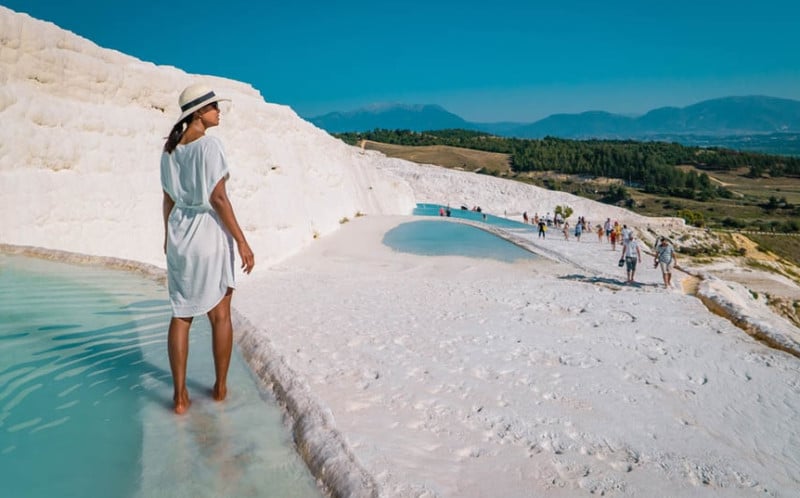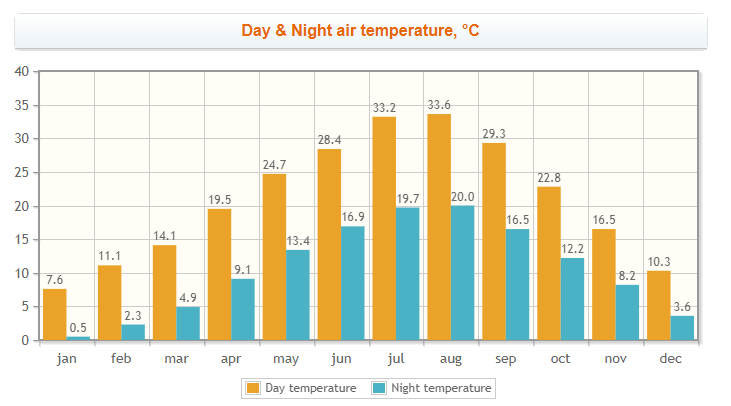Things to know about Pamukkale
- 12.01.2024 10:11
- About Turkey
Pamukkale: Where Nature's Beauty Evolves into a Friendly Destination!
What is Pamukkale?
 |
Pamukkale, Turkish for "cotton castle," is a captivating gem in southwestern Turkey. It boasts mesmerizing terraces made of white travertine, resembling fluffy cotton candy. The warm, turquoise waters flow over these terraces, forming stunning thermal pools. Picture yourself immersed in these pools, surrounded by serene mountains. Pamukkale offers both visual beauty and therapeutic benefits, where stress melts away and time slows down. It's a place to unwind and embrace the laid-back atmosphere. Let Pamukkale take you on a rejuvenating journey.
Where is Pamukkale?
Pamukkale, a mesmerizing natural wonder, is located in southwestern Turkey. Nestled in the Denizli Province, this awe-inspiring destination captivates visitors with its unique terraces of gleaming white travertine cascades, formed by mineral-rich thermal water. As a professional, it is noteworthy to mention that Pamukkale is situated within the Menderes River valley, in close proximity to the city of Denizli.
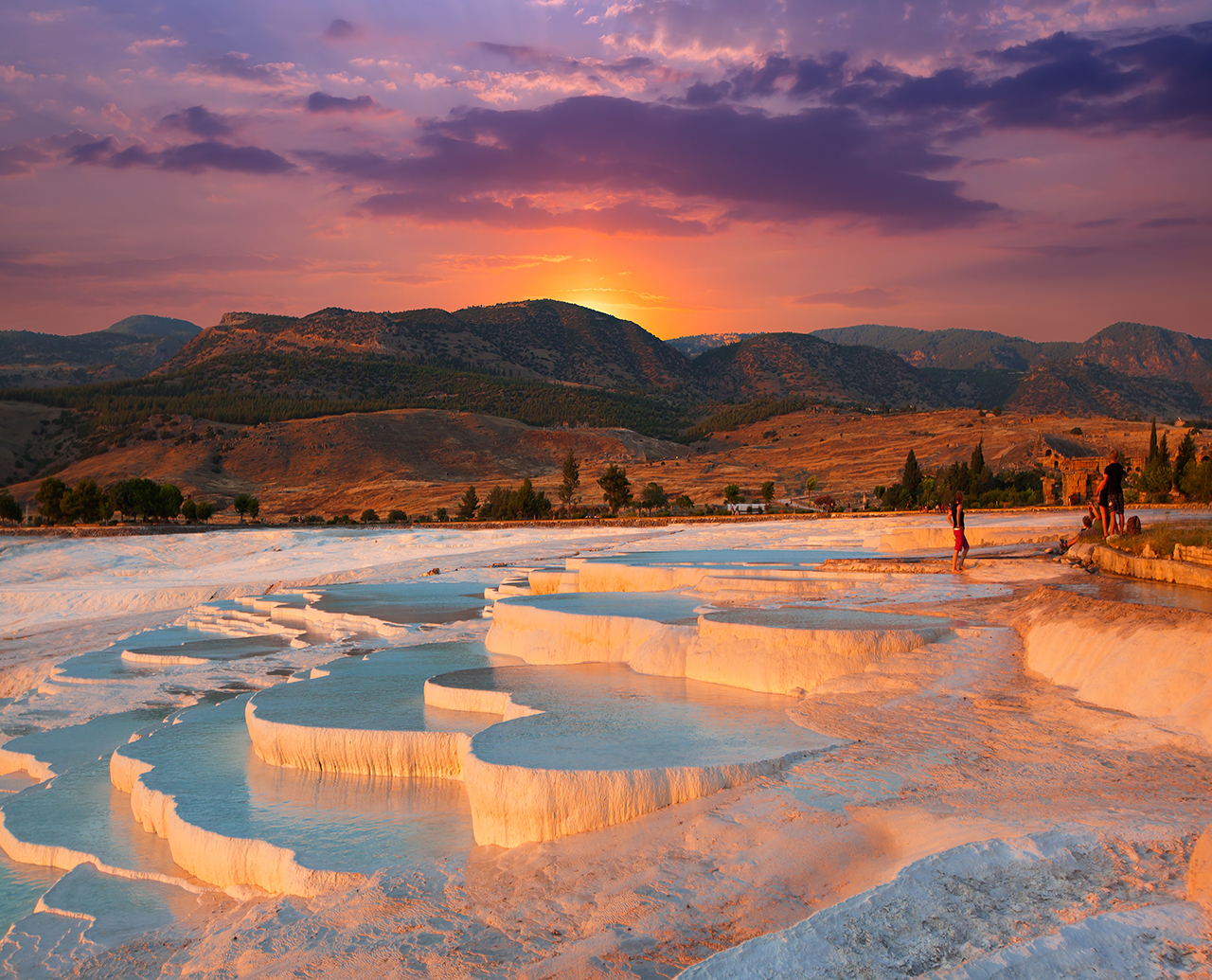 |
Renowned for its historical significance and breathtaking beauty, Pamukkale attracts countless tourists who come to bathe in its rejuvenating thermal waters while exploring the nearby ancient ruins of Hierapolis. Whether you are an archaeology enthusiast or a nature lover, Pamukkale unarguably offers an extraordinary experience that few places in the world can replicate.
What is Pamukkale like?
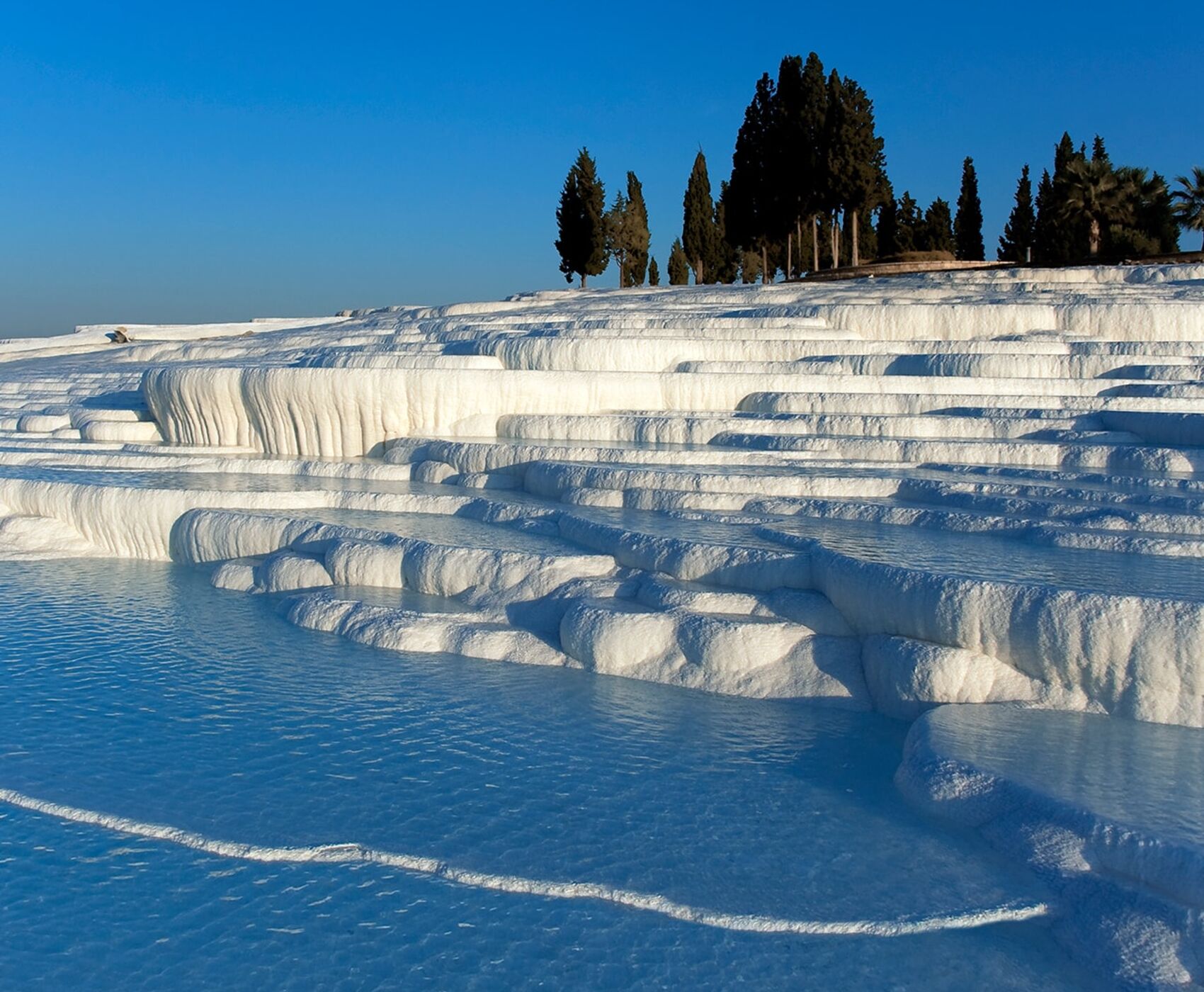 |
Pamukkale is a truly breathtaking destination. Its natural beauty and unique features make it a must-visit place. The stunning white terraces, formed by the mineral-rich thermal waters, create a magical sight that feels like stepping into a different world. The soothing hot springs offer a truly relaxing experience, allowing visitors to unwind and rejuvenate. The historical ruins of Hierapolis add an extra layer of intrigue and history to the area. It's a place that captures the heart and leaves you with memories that will last a lifetime.
Does Pamukkale's thermal water make everything just white?
The thermal water of Pamukkale, with its unique mineral composition, indeed creates a stunning white landscape. However, it is important to note that while the water itself is crystal clear, it is the deposition of calcium carbonate that gives Pamukkale its iconic white appearance. As the water flows down the terraces and pools, it gradually loses carbon dioxide, resulting in the formation of travertine - a white, calcite-based rock. This natural process takes time, and the accumulation of mineral-rich water over centuries has sculpted the striking white terraces we see today. So, while it may seem that everything is "just white" at Pamukkale, it's the mesmerizing interplay of thermal water, minerals, and time that conjures this extraordinary spectacle.
Why is the thermal water in Pamukkale Karahayıt region red?
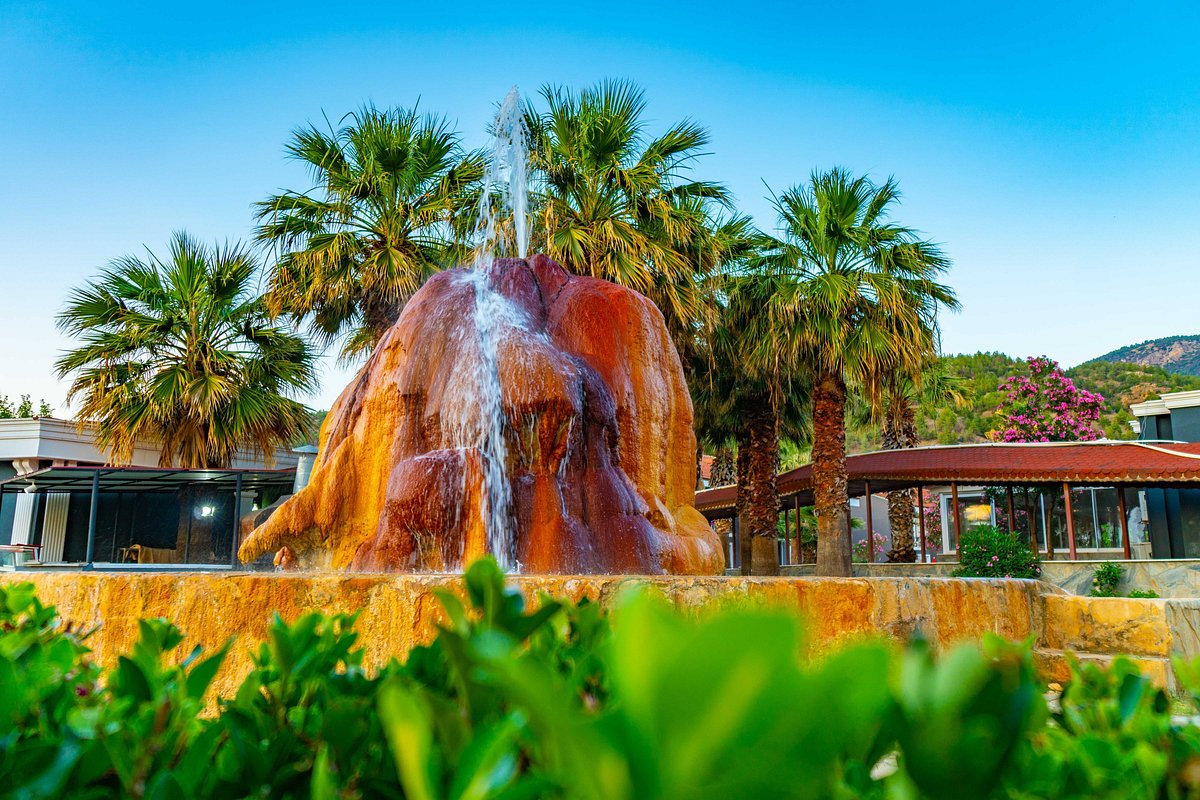 |
The distinctive red color of the thermal water in the Pamukkale Karahayıt region can be attributed to the high iron content present in the water. This phenomenon occurs due to natural mineral deposits in the surrounding rocks and soil, which dissolve in the water, giving it its unique hue. The iron-rich water in combination with the sunlight further enhances the vivid red color of the pools, creating a visually captivating natural spectacle. The presence of iron not only gives the water its striking appearance but also lends it potential therapeutic properties, making it a popular destination for wellness enthusiasts. The geological processes that have shaped this region over centuries have gifted Pamukkale Karahayıt with its captivating and aesthetically pleasing thermal waters.
When was Pamukkale discovered?
Pamukkale, known for white terraces of mineral-rich water, amazed visitors. It was discovered thousands of years ago in the ancient city of Hierapolis. The beauty of the hot springs and travertine formations captivated onlookers. Imagine the astonishment of those ancient souls when finding this ethereal landscape! Over time, Pamukkale became cherished by future generations. We empathize with the early explorers whose pioneering spirit led us to uncover this breathtaking masterpiece.
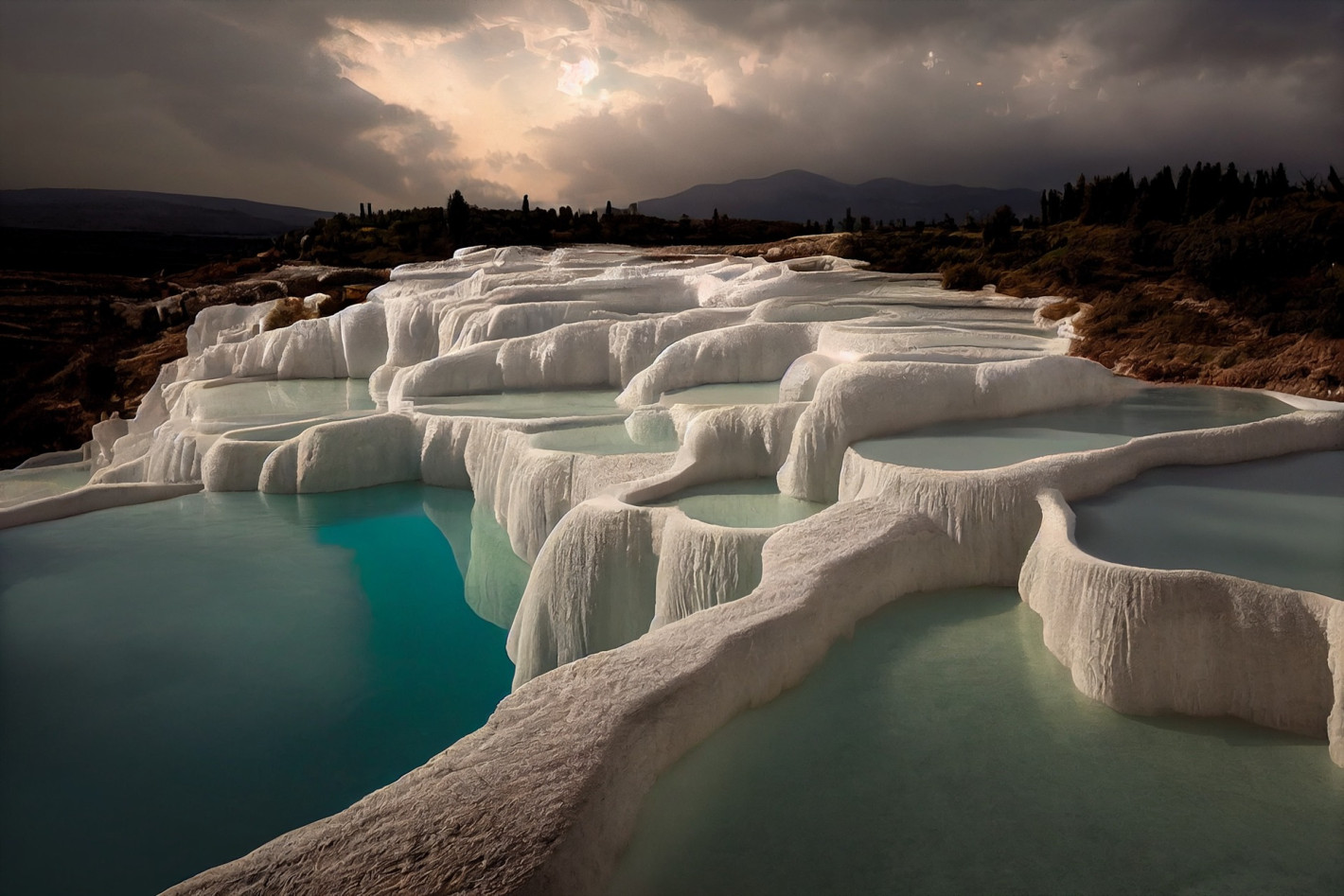 |
What is Hierapolis and how does it relate to Pamukkale?
Hierapolis is an ancient city in Turkey with a rich history. It's closely linked to Pamukkale, a unique natural wonder. Pamukkale has stunning white terraces formed by hot springs. These terraces attract visitors worldwide. The ruins of ancient Hierapolis add to the charm, allowing visitors to explore archaeological treasures and immerse themselves in the region's history. Hierapolis and Pamukkale offer an unforgettable experience with their blend of natural beauty and ancient wonders.
 |
How many different thermal waters are there in Pamukkale?
Pamukkale, in Turkey, has soothing thermal waters that leave visitors rejuvenated. Its terraces of mineral-rich white travertine cascade down the hillside, and there are seventeen thermal waters. These springs have unique temperatures and healing properties. Pamukkale offers a diverse selection of thermal waters for visitors to find their bliss. So, take a breath, let worries melt away, and embrace Pamukkale's healing waters.
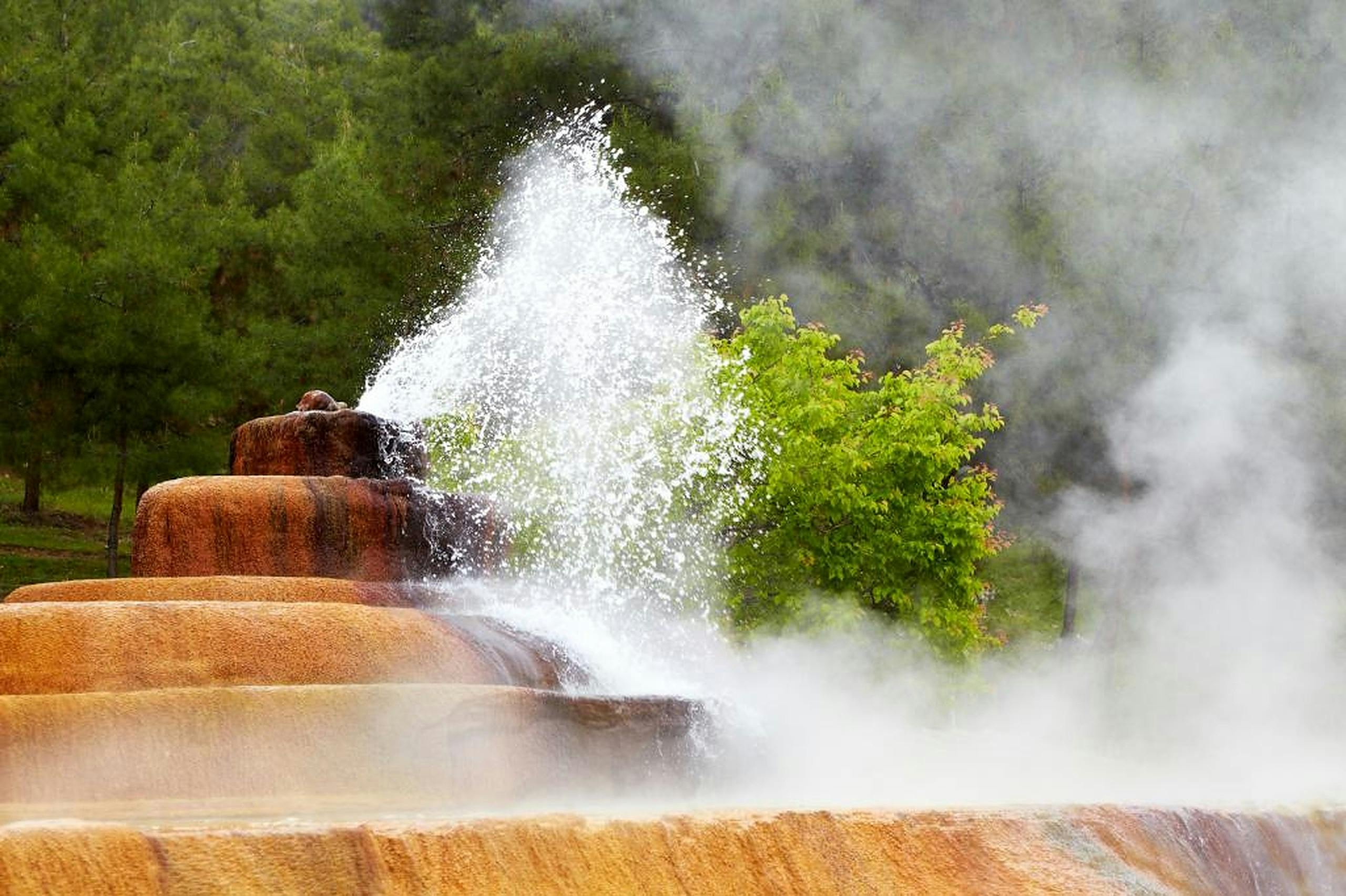 |
Is Pamukkale's thermal water drinkable?
If you're ever in the breathtaking region of Pamukkale in Turkey and find yourself gazing at the stunning white terraces formed by cascading mineral-rich water, the question of whether the thermal water is drinkable might cross your mind. Well, here's the good news - you can take a deep breath and relax. The thermal water of Pamukkale is indeed drinkable! Thanks to its mineral content, it is believed to have various health benefits like aiding digestion and promoting overall well-being. So, go ahead and savor a sip of this natural elixir while indulging in the serene beauty that surrounds you. After all, in Pamukkale, enjoying the wonders of nature comes with a refreshing sip of relaxation.
 |
What is the thermal water temperature in Pamukkale?
Located in Turkey's Denizli province, Pamukkale is a captivating natural wonder with irresistibly relaxing thermal waters. The temperature of these geothermal springs ranges from 36 to 38 degrees Celsius (97 to 100 degrees Fahrenheit). Immerse yourself in the blissful warmth, wash away everyday stresses, and enjoy a serene escape in nature's own spa at Pamukkale.
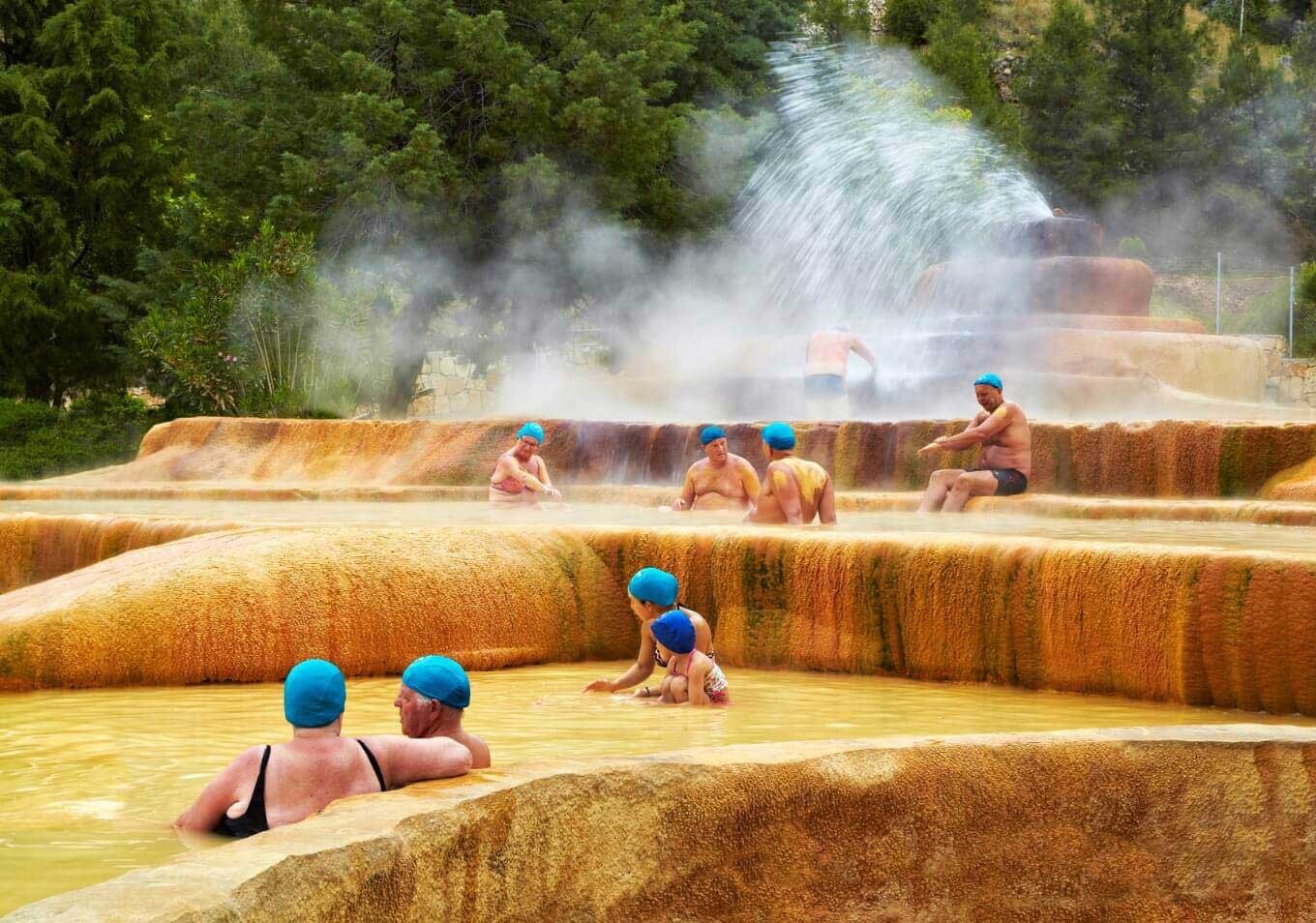 |
How far is Pamukkale from Turkey's important tourist cities?
Pamukkale, with its stunning travertine terraces and ancient Hierapolis ruins, is indeed a must-visit destination. Located in the Denizli province of Turkey, Pamukkale is approximately 20 kilometers from the city center of Denizli. Getting there from Turkey's important tourist cities might require some travel time, but it's well worth the effort. If you're coming from Istanbul, for example, you'll need to cover a distance of about 600 kilometers, which can take around 8-9 hours by road or a shorter duration by air. Similarly, if you're planning to visit from Antalya, you're looking at a journey of around 235 kilometers, which usually takes around 3-4 hours by road. While the distance may vary depending on your starting point, I assure you that the enchanting beauty of Pamukkale will make the journey worthwhile and leave you with unforgettable memories.
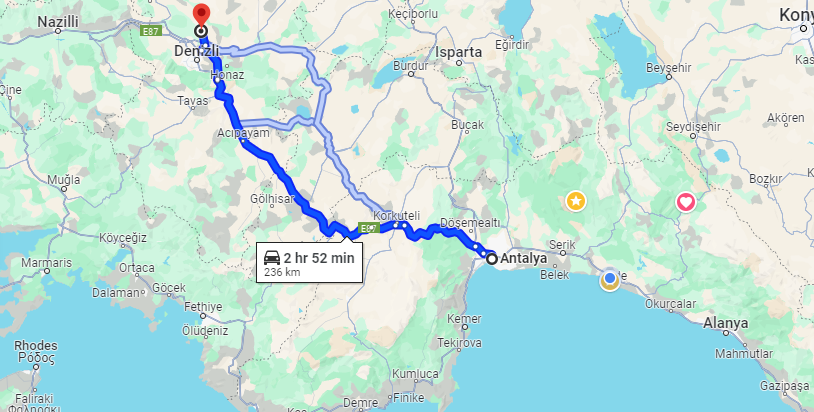 |
Are there any settlements in Pamukkale?
Yes, there are settlements in Pamukkale. Located in southwestern Turkey, Pamukkale is known for its natural beauty and history. The village of Pamukkale is a popular destination for tourists, offering traditional Turkish hospitality and a range of accommodations. Surrounding the village, there are other settlements that provide insight into rural Turkish life. These settlements play a crucial role in the local community and contribute to the preservation of this UNESCO World Heritage site.
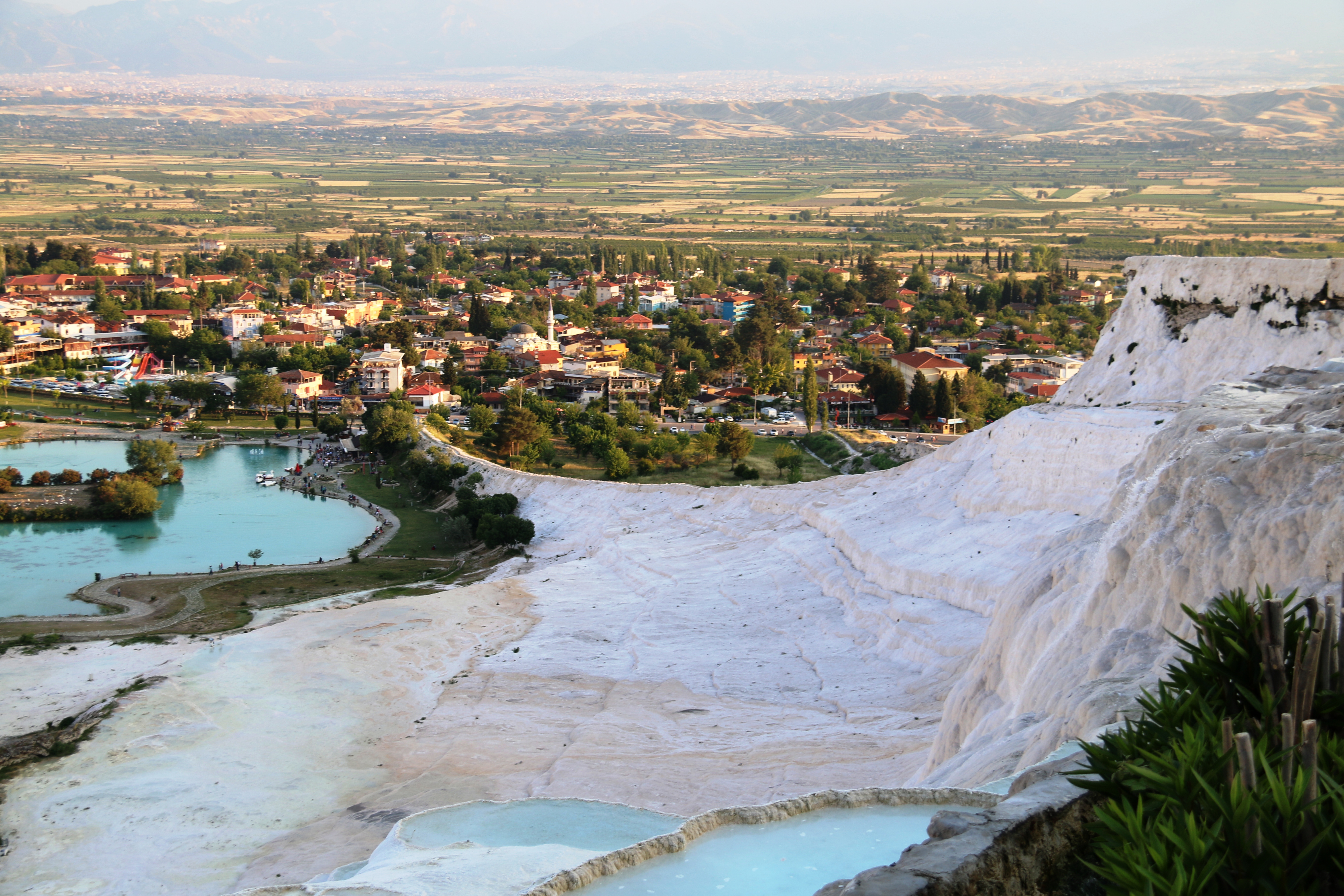 |
Are there hotels in Pamukkale?
Yes, there are hotels in Pamukkale that cater to the needs of tourists visiting this picturesque destination. Pamukkale, located in southwestern Turkey, attracts visitors from all around the world who come to witness its unique white terraces and thermal springs. To accommodate these travelers, a range of hotels can be found in the area, offering comfortable accommodations and various amenities.
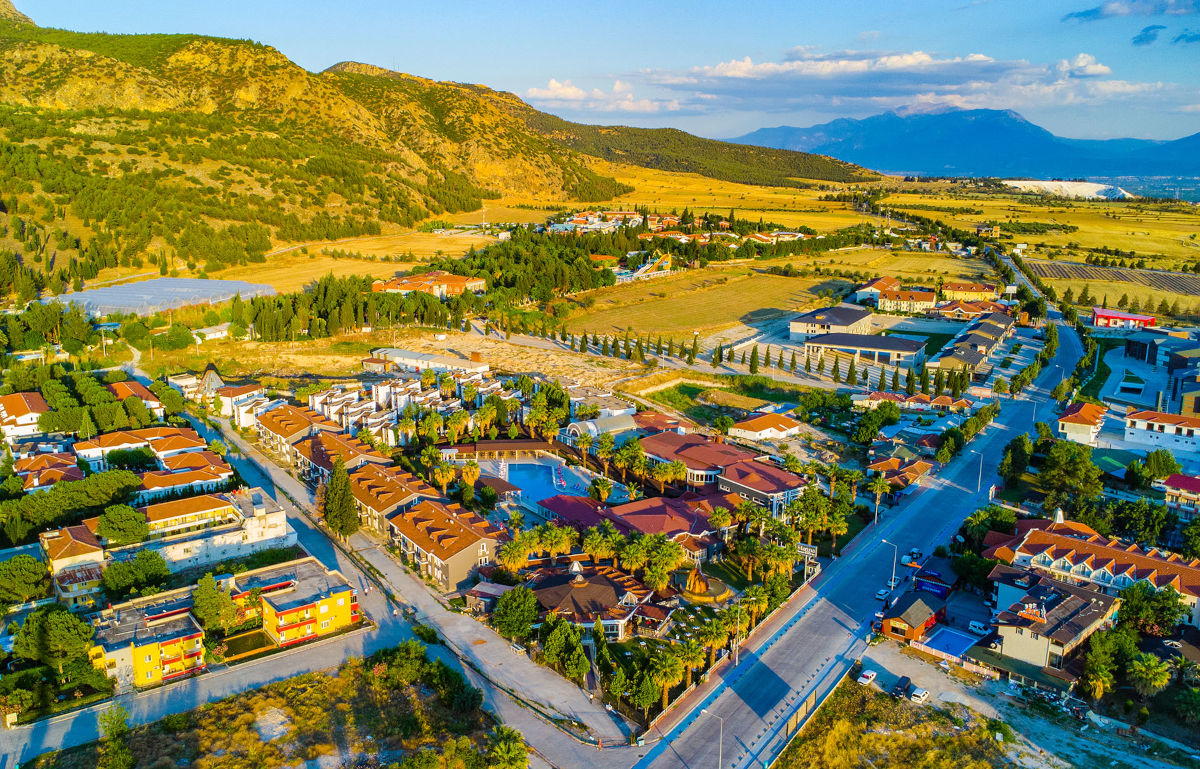 |
From luxury resorts with panoramic views to cozy guesthouses nestled amid the natural beauty, Pamukkale provides options for every traveler's preference and budget. Whether you are looking to rejuvenate in thermal pools or explore the ancient ruins nearby, there are hotels in Pamukkale ready to meet your lodging needs.
Where to stay in Pamukkale?
If you are looking for accommodations in Pamukkale, there are various options available to suit your preferences and needs. Pamukkale is a renowned tourist destination in Turkey, known for its mesmerizing natural thermal pools and stunning travertine terraces. To make the most of your visit, it is essential to choose the right place to stay.
One of the popular choices for visitors is the hotels and resorts located near the Pamukkale
Thermal Pools. These establishments offer direct access to the unique geological formations, allowing you to enjoy the healing and relaxing benefits of the thermal waters. In addition, these hotels often provide a range of amenities, including spa and wellness facilities, restaurants offering exquisite culinary experiences, and comfortable rooms or suites for a pleasant stay.
 |
Another option to consider is the hotels located in the nearby town of Denizli, which is just a short distance away from Pamukkale. Denizli offers a wider range of accommodations, varying from budget-friendly options to luxury hotels. Staying in Denizli allows you to explore both the natural wonders of Pamukkale and the historical sites in the town, such as the ancient city of Laodicea and the Denizli Archaeological Museum.
 |
If you are seeking a more intimate and authentic experience, you may consider staying at one of the boutique hotels or guesthouses in the villages surrounding Pamukkale. These establishments often provide a cozy and personalized atmosphere, allowing you to immerse yourself in the local culture and traditions. Moreover, staying in these villages offers the opportunity to discover hidden gems off the beaten path and enjoy the tranquility of the surrounding countryside.
How to get to Pamukkale?
To reach the ethereal beauty of Pamukkale, there are several professional ways to embark on this extraordinary journey. Nestled in southwestern Turkey, Pamukkale is easily accessible by both air and road. For those preferring air travel, the closest airport is Denizli Cardak Airport, which offers frequent domestic flights from major cities like Istanbul and Ankara. Once you land, hiring a taxi or taking a shuttle bus to cover the remaining 67 kilometers to Pamukkale is an efficient and reliable option.
 |
Alternatively, road travel provides a scenic route, allowing you to savor the breathtaking Turkish landscape. Should you opt for this option, major roads like the D320 or D585 offer a comfortable and well-maintained drive. Whether you choose to take to the skies or venture down the roads less traveled, a professional approach will ensure a seamless journey to Pamukkale, where nature's marvels await.
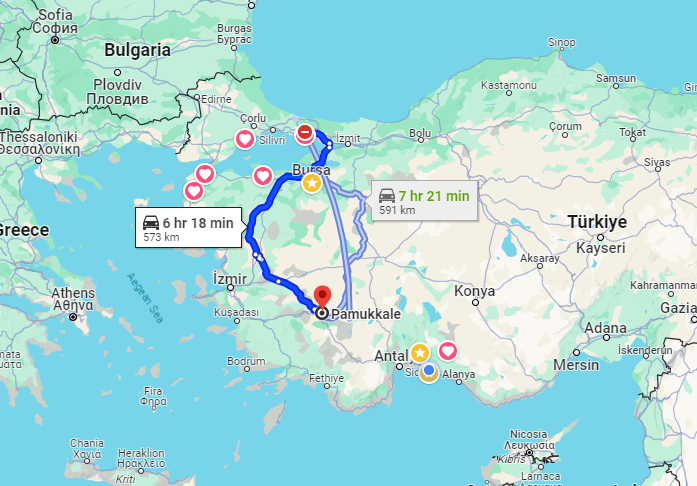 |
Are there tours to Pamukkale from touristic cities?
Inquiring about the availability of tours to Pamukkale from various touristic cities is indeed a valid concern for travelers seeking to explore the mesmerizing beauty of this natural wonder. With a professional tone, it is worth mentioning that there are numerous tour operators and travel agencies that offer guided trips to Pamukkale from popular tourist destinations nearby.
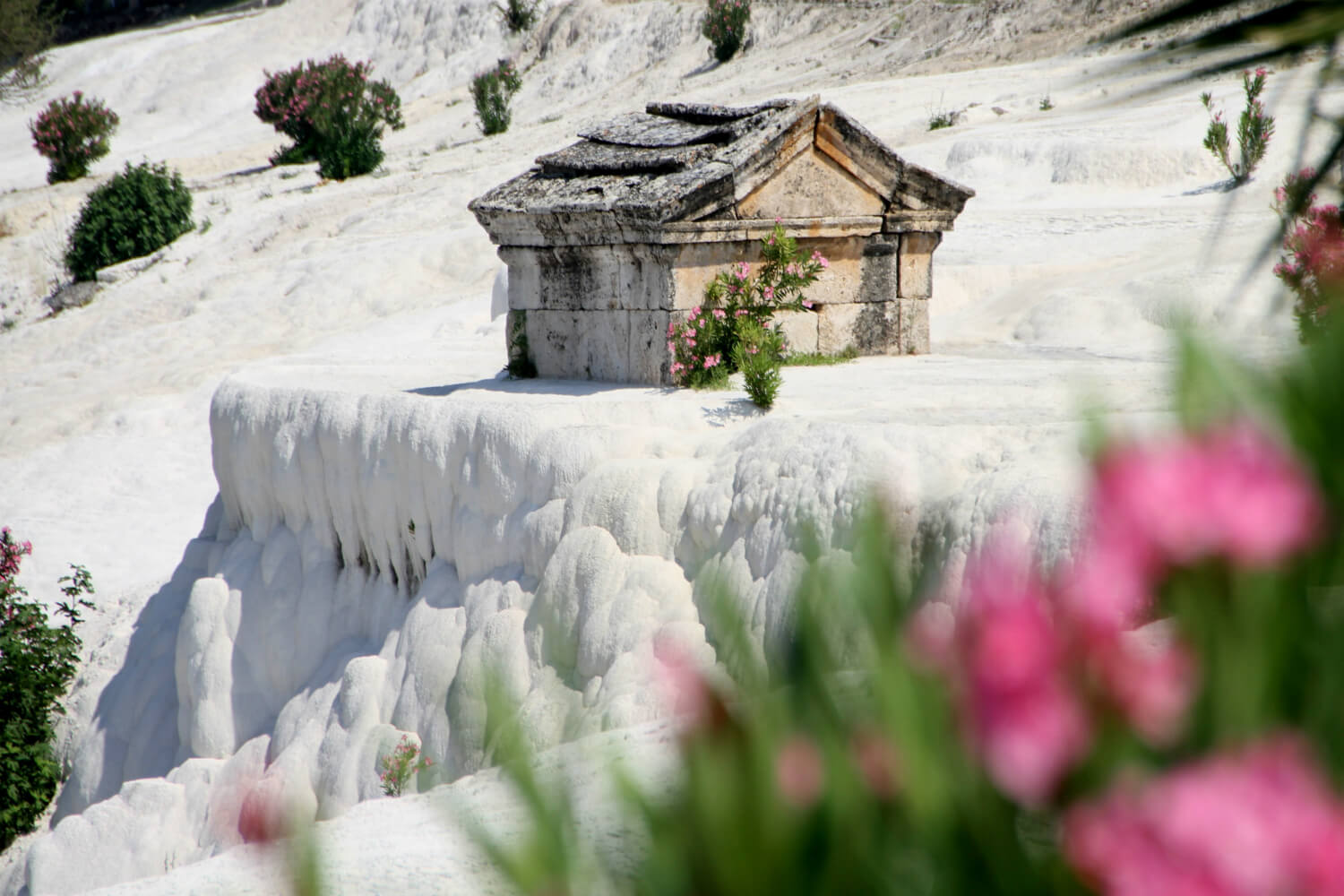 |
These cities, such as Istanbul, Izmir, and Antalya, boast a well-developed tourism infrastructure, making it convenient for visitors to access organized tours to Pamukkale. These tours often include transportation, multilingual guides, and ample time to explore the breathtaking terraces and therapeutic thermal pools of Pamukkale, as well as its adjacent ancient city ruins of Hierapolis. With meticulous planning and research, travelers can find reputable tour operators who will ensure a seamless and memorable experience to Pamukkale, allowing them to fully immerse themselves in the natural and historical wonders of this extraordinary destination.
.jpg) |
Daily tours from tourist resorts to Pamukkale
Daily Pamukkale tour from Side hotels
Daily Pamukkale tour from Alanya hotels
Daily Pamukkale tour from Antalya hotels
Daily Pamukkale tour from Belek hotels
Daily Pamukkale tour from Kemer hotels
Daily Pamukkale tour from Fethiye hotels
Daily Pamukkale tour from Marmaris hotels
Daily Pamukkale tour from Bodrum hotels
Daily Pamukkale tour from Kuşadası hotels
Daily Pamukkale tour from Didim hotels
Are there shopping breaks during Pamukkale tours?
Yes, in all Pamukkale tours, there is at least one shopping break, and in some tour agencies, two shopping breaks.
Pamukkale tour is a very costly tour for tour agencies. No tour agency does a Pamukkale tour without shopping breaks.
It is true that tour agencies receive commission from the purchases made by participants during shopping breaks, and this commission enables tour agencies to complete the tour without losing money.
There is no tour agency that offers a Pamukkale tour without a shopping break. The price of Pamukkale tours without a shopping break may be twice the current price.
Although there is a shopping break during Pamukkale tours, shopping is not mandatory.
Is it possible to swim in Pamukkale thermal pool?
Absolutely! Pamukkale, with its stunning white terraces and natural thermal pools, is indeed a captivating sight. While it may be tempting to dive in and swim in these picturesque pools, unfortunately, swimming is no longer allowed. Due to the fragility of the terraces and the need to preserve this UNESCO World Heritage Site, swimming has been prohibited to protect the unique geological formations.
 |
Although it may be disappointing for those seeking a refreshing dip, this decision ensures that future generations can continue to marvel at the natural beauty of Pamukkale. However, fear not! Visitors can still immerse themselves in the warm mineral-rich waters of nearby Cleopatra's Pool, which offers a different but equally mesmerizing swimming experience. So while you won't be able to swim in the Pamukkale thermal pool itself, there are still plenty of water-based adventures awaiting you in this remarkable corner of Turkey.
What is the water temperature in Pamukkale Cleopatra thermal pool?
The water temperature in Pamukkale Cleopatra thermal pool is consistently warm and soothing. This natural wonder maintains an average temperature of around 36-38 degrees Celsius all year round. With its mineral-rich waters and picturesque limestone terraces, this iconic attraction in Turkey offers a serene retreat for tranquility and rejuvenation. So whether you're seeking muscle tension relief or a blissful soak, the inviting water temperature ensures a relaxing experience.
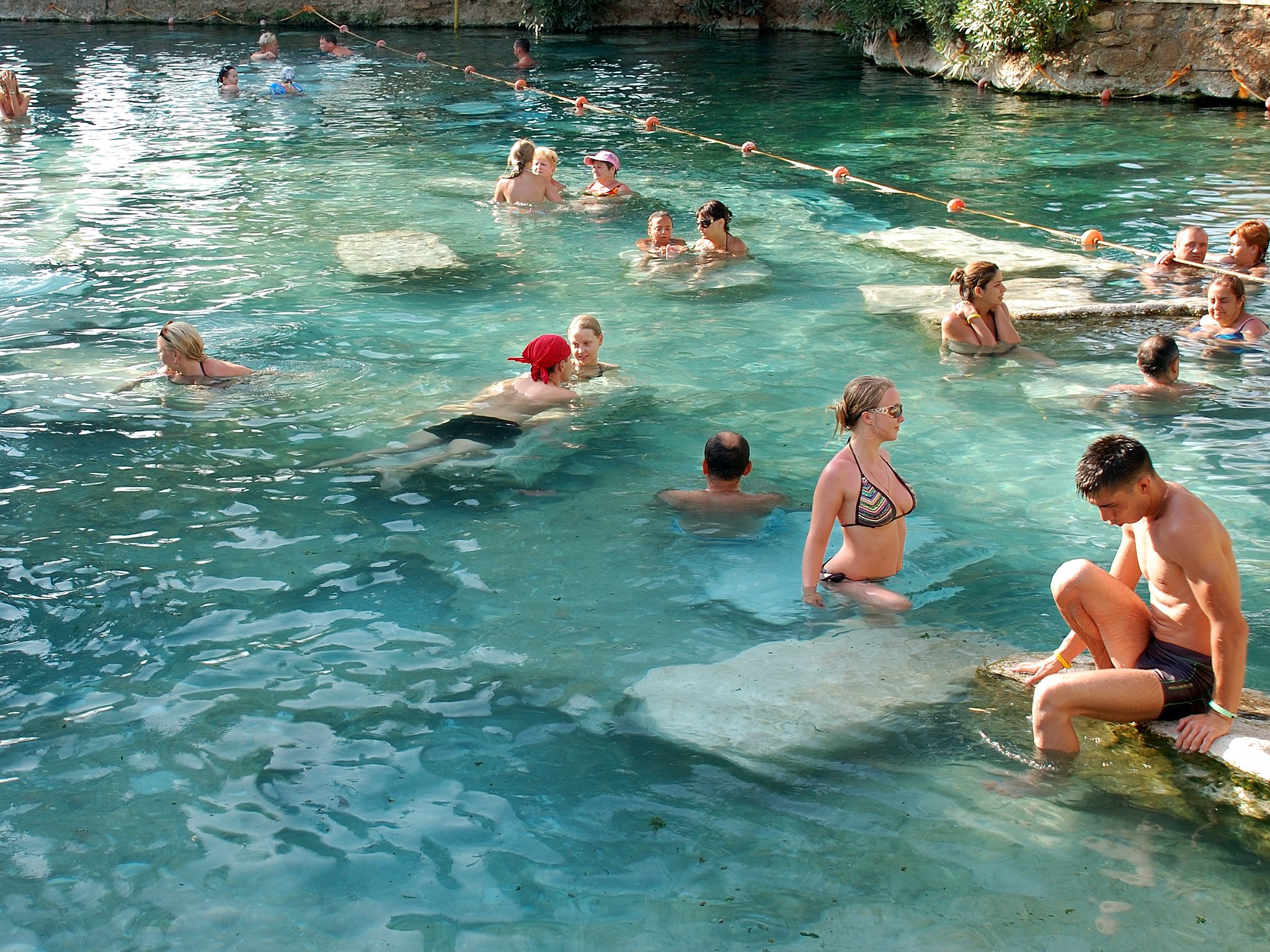 |
Is Pamukkale Cleopatra thermal pool charged?
Pamukkale, located in Turkey, has stunning terraces and thermal pools. Is the Cleopatra thermal pool charged? Yes, a fee is required to access it for preservation and maintenance. This fee ensures a safe experience and contributes to the site's upkeep. By investing in preservation, visitors can enjoy the mineral-rich water and sustainably manage Pamukkale's natural beauty for future generations. While there is a charge, the experience and preservation are valuable.
How much does it cost to swim at the Cleopatra thermal pool in Pamukkale?
The Cleopatra thermal pool in Pamukkale offers visitors a unique and rejuvenating swimming experience. When it comes to the cost, pricing may vary based on several factors. Generally, the admission fees for swimming in the Cleopatra thermal pool range from 300 to 350 Turkish Lira per person, which is approximately 10 to 12 US dollars. It's important to note that these rates can be subject to change, so it's recommended to check with the official website or local tour operators for the most up-to-date information. Additionally, visitors may incur additional charges for towel rentals or access to amenities such as lockers and showers. Overall, indulging in the luxurious experience of swimming at the Cleopatra thermal pool is not only a treat for the mind and body but also provides good value for those seeking a truly memorable experience.
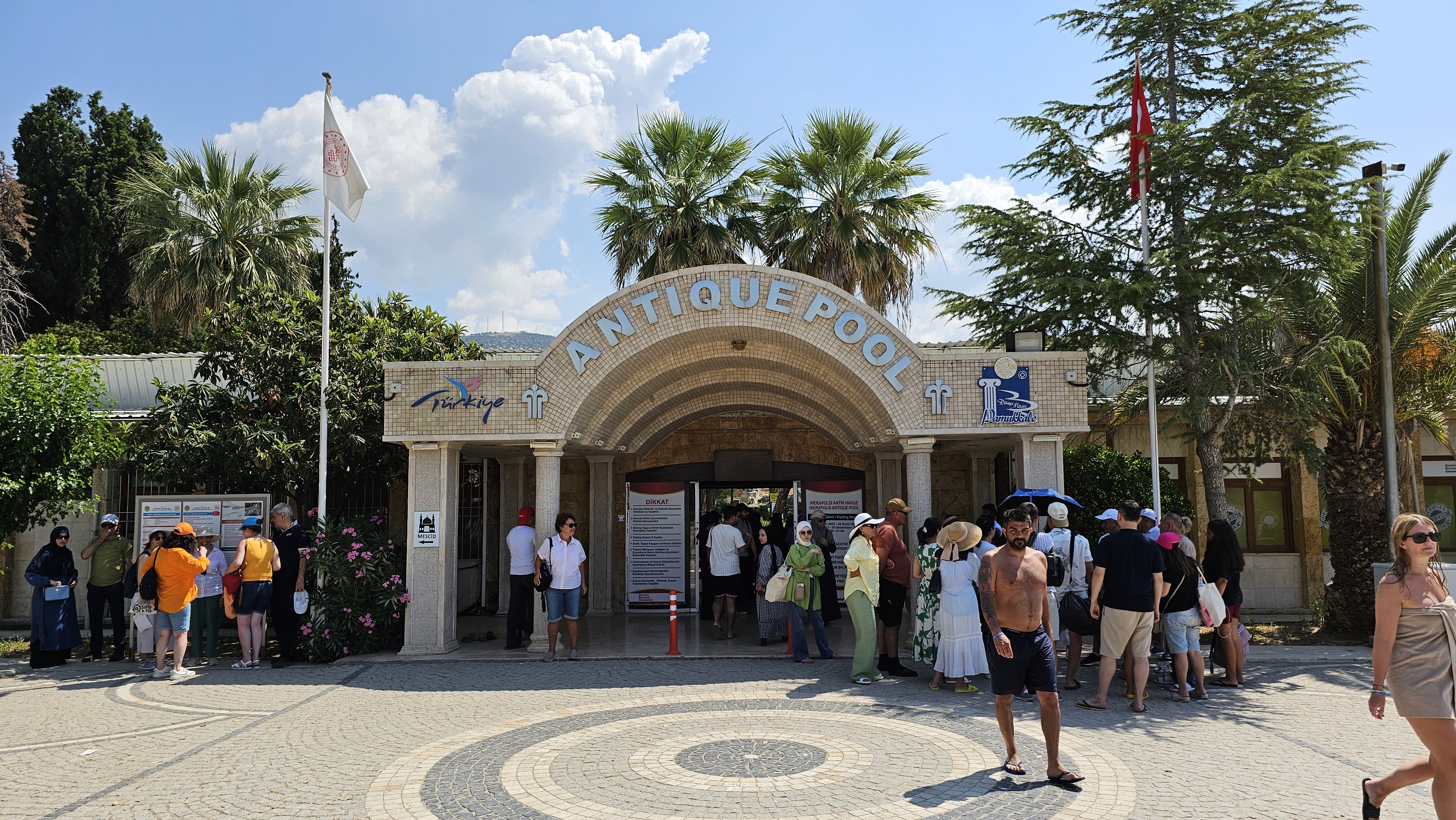 |
Is it possible to walk on Pamukkale white travertines?
Unfortunately no! Walking on white travertine has not been possible since 1993 in order to protect the travertine formations and the white cover. It is free to walk along a path among the white travertines. There is a ticket office at the beginning of this pathway.
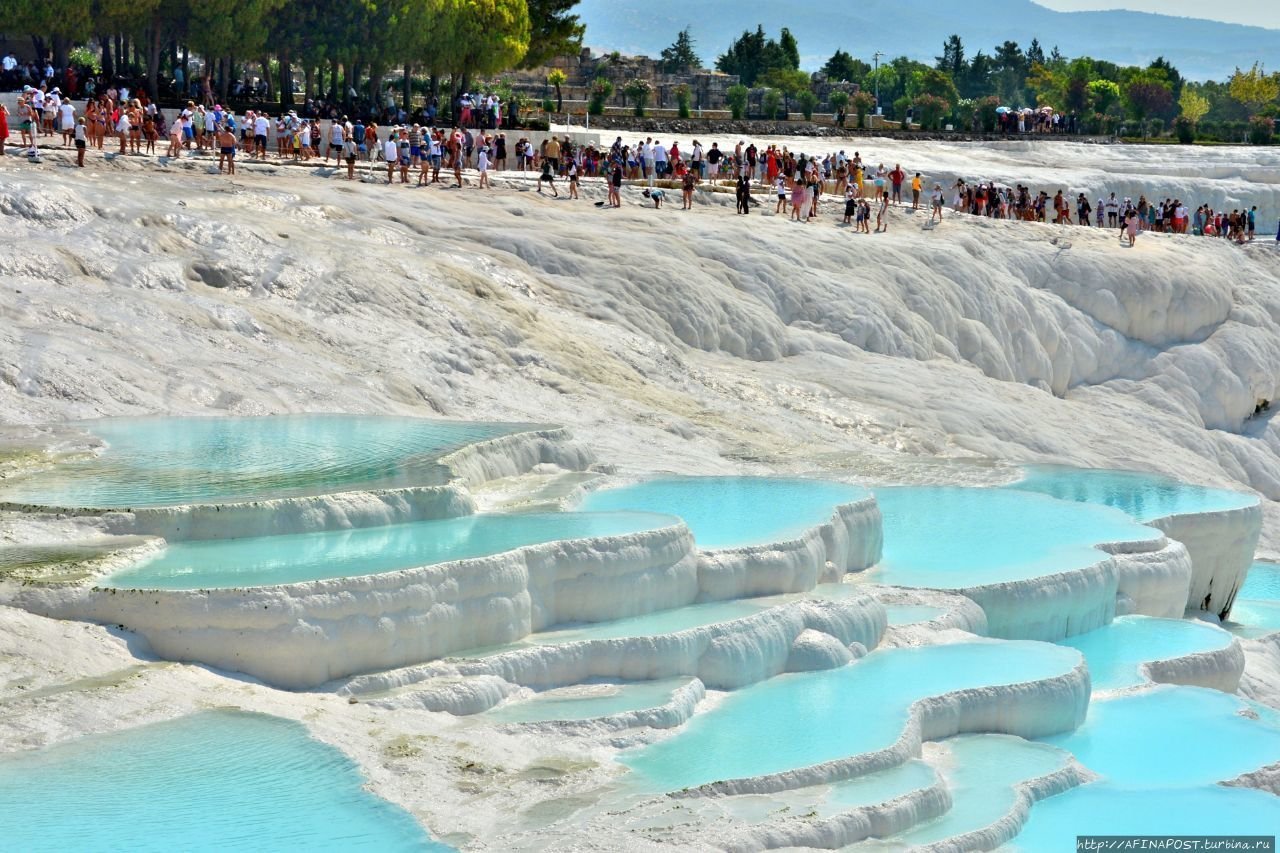 |
It is free to walk on this path to the hill where the ancient city of Hierapolis and the Cleopatra thermal pool are located. The walk takes approximately 20 - 20 minutes. In the area at the top of the white travertines, you can visit the ruins of the ancient city of Hierapolis, the ancient city necropolis (ancient cemetery), the ancient theater and the Pamukkale museum, and swim in the Cleopatra thermal pool.
Are there hot air balloon rides in Pamukkale?
Yes, there are hot air balloon rides available in Pamukkale. This breathtaking destination in Turkey not only offers the stunning terraces of white mineral-rich hot springs but also the opportunity to experience the beauty from the sky. Pamukkale's hot air balloon rides provide a unique perspective, allowing passengers to float gently above the magical landscape, capturing panoramic views of the calcium-rich pools and ancient ruins. These professionally organized balloon rides offer a safe and memorable adventure, catering to both thrill-seekers and nature enthusiasts alike. Whether it's embracing the tranquil beauty of sunrise or witnessing the vibrant hues of sunset, a hot air balloon ride in Pamukkale promises an unforgettable experience filled with awe-inspiring moments.
 |
How much cost is the hot air balloon rides in Pamukkale?
When it comes to experiencing the breathtaking beauty of Pamukkale from a unique perspective, hot air balloon rides are an absolute must. For those curious about the cost, one can expect a range of prices depending on various factors. Professional hot air balloon rides in Pamukkale typically start around $150 per person for a standard flight, but certain factors such as duration, balloon capacity, and additional inclusions can affect the overall cost. It is important to note that this cost is merely an estimate and may vary from one operator to another. Nonetheless, investing in such an awe-inspiring experience is undoubtedly worth every penny, as it promises unforgettable vistas and memories that will last a lifetime.
Distances to Pamukkale
Side / Manavgat - Pamukkale: 309 km
(https://maps.app.goo.gl/988rjEGBcV1srwCo8)
Alanya - Pamukkale: 370 km
(https://maps.app.goo.gl/8rtpmSYr4QbLZxzXA)
Antalya - Pamukkale: 241 km
(https://maps.app.goo.gl/NN84Na86oHSi7XE47)
Belek - Pamukkale:282 km
(https://maps.app.goo.gl/wf3eMeDFAbqJbU8q9)
Kemer - Pamukkale:273 km
(https://maps.app.goo.gl/gXp6YiSQGxnmFw5v7)
Fethiye - Pamukkale:195 km
(https://maps.app.goo.gl/mb2QDhG4D8kn83aF9)
Marmaris - Pamukkale: 207 km
(https://maps.app.goo.gl/mb2QDhG4D8kn83aF9)
Bodrum - Pamukkale: 254 km
(https://maps.app.goo.gl/umDqVwdKVgnDDiBm7)
Didim - Pamukkale:240 km
(https://maps.app.goo.gl/AK8GASiXSFPJnXh77)
Kusadasi - Pamukkale: 200 km
(https://maps.app.goo.gl/7MsFU277KRx98jgU7)
Istanbul - Pamukkale: 575 km
(https://maps.app.goo.gl/y22bGXAFtddWncjW9)
Cappadocia - Pamukkale: 614 km
(https://maps.app.goo.gl/BwjNjXmyY49U7VhY6)
Weather in Pamukkale
The Pamukkale region experiences hot, dry, and clear summers, as well as cold, rainy, and partly cloudy winters. Throughout the year, the temperature typically ranges between 2°C and 35°C, with occasional lows of below -3°C and highs above 38°C.
Considering the beach/pool score, the optimum period to visit Pamukkale for engaging in warm weather activities is from mid-June to mid-September.
|
Pamukkale's average daytime and nighttime temperatures |

